Posted on 12/22/2021
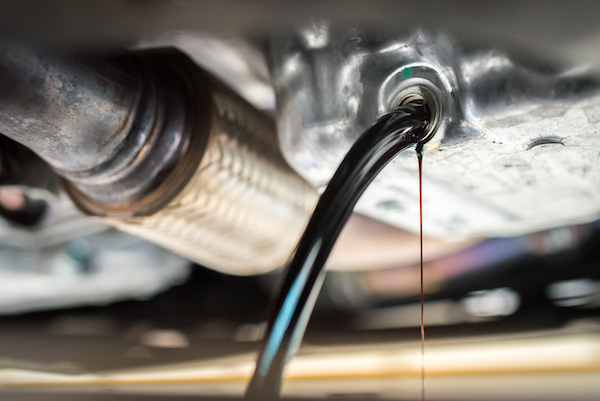
You park your car at a store and go inside. When you come back you notice some sort of fluid underneath your car. Upon further inspection, you realize that said fluid is leaking out of your car and you're not exactly sure what to do next. The only thing you do know is that this can't be good. Fear not! Once you understand the different types of car fluid leaks, the easier it will be to rectify the situation. Keep reading on for the most common types of car fluid leaks to be prepared if this ever happens to you! Coolant Leak - If the leak coming out of your car is a vibrant orange, pink or green, chances are you're dealing with a coolant, also known as antifreeze. This isn't a massive issue if you're dealing with an older car, but if your car is considered 'modern', it may be worth looking into as these cars are built to prevent leaks. Oil Leak - If the fluid underneath your car is dark black in color, you're probably d ... read more
Posted on 11/29/2021
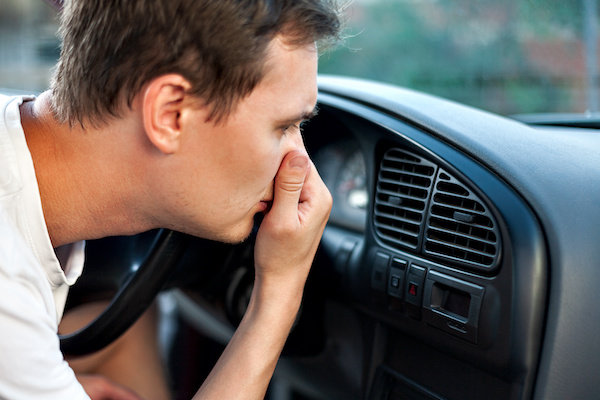
Does your vehicle have a bad, lingering odor or smell? Your first instinct will probably be to check for any food you may have forgotten in your car. Otherwise, your car may be dealing with other problems that are giving off that unpleasant scent. Here are some odd smells that may indicate an issue with your vehicle: Rotten Eggs - If you smell something similar to rotten eggs, it's most likely an issue with your catalytic converter. When your car overheats, it won't be able to transform certain gases, which is why you may catch this odor. Moldy - When you turn your A/C on, and it releases a musty smell from the vents, you've probably got mold or mildew growing in the system. Burnt Paper - The smell of burning paper, especially emitted when switching gears, might indicate that the clutch is burning and slipping. The increased contact burns the paper clutch surfaces. Burnt Rubber - Old, slipping drive belts or loose hoses that rub against other components too much c ... read more
Posted on 10/26/2021

As you were probably taught in driver's ed, steering wheel hand position is an important consideration when you sit behind the wheel. With the proper hand placement, you can safely navigate your vehicle. What Is the Proper Steering Wheel Hand Placement? The NHTSA advises that motorists should set their hands on the outside of the steering wheel, on opposite left and right sides. This is sometimes referred to as the 9 o'clock and 3 o'clock position. In this state, your hands are correctly located to control your car, and the chances of injury are minimized. Additionally, it is recommended that you maintain a firm but gentle grip on the steering wheel. It would help if you used your fingers to control the steering wheel, keep your thumbs along the front of the wheel, and avoid turning the wheel while grasping the inside. Tips for Holding Your Steering Wheel Properly Now, let's check the three things you can do to ensure you properly hold your steering ... read more
Posted on 9/27/2021
.jpeg)
You already know that automobiles cannot function safely or reliably without healthy, sturdy wheels. What you may not know is that every one of your wheels has a wheel bearing. Wheel bearings are crucial for your wheels and their assemblies to work synchronically during your drive. Wheel bearings are usually prone to abuse, which is why it's necessary to know their warning symptoms. What is a Wheel Bearing? To understand how the wheel bearings can go wrong, you'll need to understand better how it works. A set of wheel bearings are steel ball-like pieces held together by a metal ring called a race. A hub is a metal lump that you can find at the center of your wheels. And the bearings are tucked inside this hub, helping lessen the rolling friction of your wheels. What Are the Symptoms of Bad Wheel Bearings? Ball bearings are one of the most preferred types of wheel bearings used today. The other type of bearings is called tapered roller bearings, which a ... read more
Posted on 8/23/2021
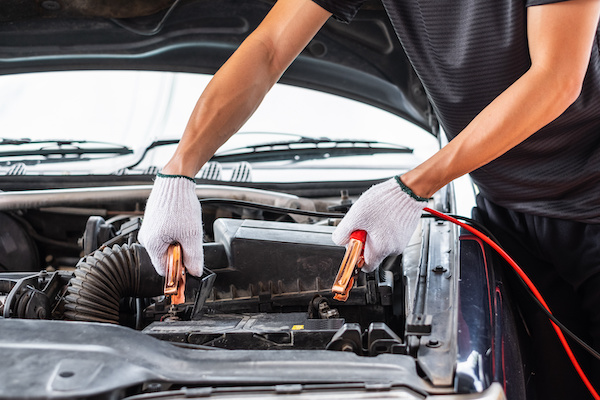
The battery is the heart of your vehicle providing the energy for everything from the starter and engine to the radio, but batteries are not a once-in-a-lifetime purchase. Most batteries last two to five years depending on the type of battery, the vehicle, and the climate in which you live. It's important to keep track of the date you purchase your battery and when it should be replaced, but sometimes your battery may start to die before the end of its expected lifespan. So, how can you tell if your battery is about to die and needs immediate replacement? When the battery is about to die, the engine will be slow to start instead of starting immediately when you turn the key. The vehicle won't start at all. When you try to start the vehicle, all you hear is a clicking or buzzing sound. When you visually examine the battery, if you notice corrosion on the battery or battery cable ends it could be an indication that the battery is leaking. You notice your headlights aren't ... read more
Posted on 7/21/2021

Nothing is more annoying than hearing your car squeal whenever you brake. Beyond this ear-piercing sound, it could be indicating that something is wrong with your brake system. Brakes are an integral part of your vehicle, but they can become a safety hazard without proper maintenance. Brakes will sometimes make noise when they are not warm or if they are newly replaced brakes. They will also occasionally screech in wet and slippery road conditions. But the sounds should not linger much beyond those circumstances. If you notice consistent squealing or grinding, then that calls for attention. What Are the Common Causes of Squealing Brakes? Worn Pads Worn-out brake pads are the number one major cause of squeaking brakes. The sound serves as a warning to replace the pads before they cause damage to the rotor. Slamming the Brakes too Hard You can never expect what you may encounter on the road. From time to time, we may need to slam on our brakes. Whenever this happens ... read more
Posted on 6/25/2021
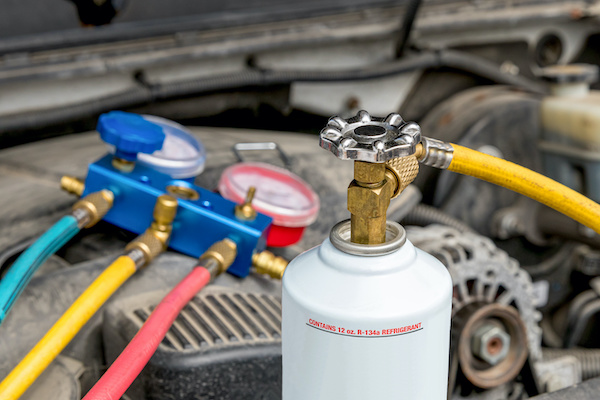
Unless you live in areas with sweltering climates, your vehicle's AC will not need recharging for at least three years. Of course, you might opt for a proactive approach and take your car for an AC recharge every three years as part of your maintenance schedule. All the same, you don't need to recharge your AC as long as you are enjoying a cool, comfortable drive. Your vehicle's AC system performs on two distinct sides- the high and the low side. Usually, the Freon starts on the low-pressure side as gas and is converted into liquid on the high side. This consistent circulation of the refrigerant across the low and high-pressure sides is what keeps your vehicle cool. Your vehicle's AC is an enclosed system. This is because it constantly recirculates the Freon and always needs to be pressurized. Suffice to say, these systems might eventually develop leaks, ultimately reducing the refrigerant levels. With time, the system pressure and that of the refrigerant will drop be ... read more
Posted on 5/27/2021
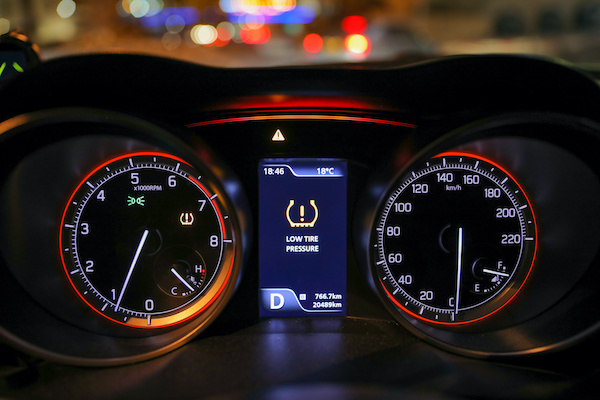
The Tire Pressure Monitoring System (TPMS) alerts drivers when tire pressure is too low, resulting in a potentially unsafe driving condition. The TPMS indicator is found on the dashboard. It is the indicator in the shape of a U with an exclamation point in the middle. An illuminated TPMS indicator means that the tire pressure of your vehicle is low. Low tire pressure leads to undue tire wear and potentially tire failure. Understanding the importance of tire pressure and identifying a TPMS indicator is key to practicing safe driving habits and ensuring the overall longevity of your vehicle. Overinflation and Underinflation Too much or too little air pressure in your tires can be detrimental to your vehicle. Overinflated tires lead to reduced traction, excessive wear on the tires, and heavier road impacts. An overinflated tire shows wear at the center of the tread. Underinflation of the tire causes a diminished response, poor fuel economy, uncontrolled heat, and tire overload. Underinf ... read more
Posted on 4/26/2021
.jpeg)
The air we breathe is very crucial to our respiratory health. A cabin filter is one of the car's predominant parts that have to be in perfect working condition to keep your cabin air fresh and protect it from harmful contaminants from the outside. Air filters can get clogged with smog, leaves, or debris, and this can make your air conditioner work harder to push cool air through the filter. Afterward, it can affect the entire air conditioning system. Multiple vehicle manufacturers recommend cabin air filters be replaced every 12 months or 20,000 kilometers. Below are some of the signs that your cabin air filter requires replacement. Poor Airflow From Vents Sometimes narrow air ducts can be blocked by dust buildup and insects. A clogged air filter wouldn't filter air effectively as a clean one would do. It leads to reduced airflow within the air conditioning system which in turn promotes vents blowing air with limited pressure. Additionally, it adds extr ... read more
Posted on 3/17/2021
.jpeg)
The transmission is a critical part of the vehicle that is sandwiched between the engine and the wheels. It changes the engine's combustion power to enough rotational force and speed that pushes the wheels. The transmission is designed in such a way that it takes advantage of gear ratio to enhance engine efficiency and reduce fuel consumption while balancing output torque and speed. The transmission can be manual or automatic. Both transmission types serve a similar purpose, but they achieve the function using different technologies. As a component that influences the power and speed transmitted from the engine to the wheels, it is important to maintain the transmission through regular checks and repairs. It has many interconnected parts that rub, rotate, and move against each other. The movement and the interaction of the components expose them to extreme heat and friction. As a result, the transmission might experience troubles associated with usage, wear, and tear. However, the ... read more